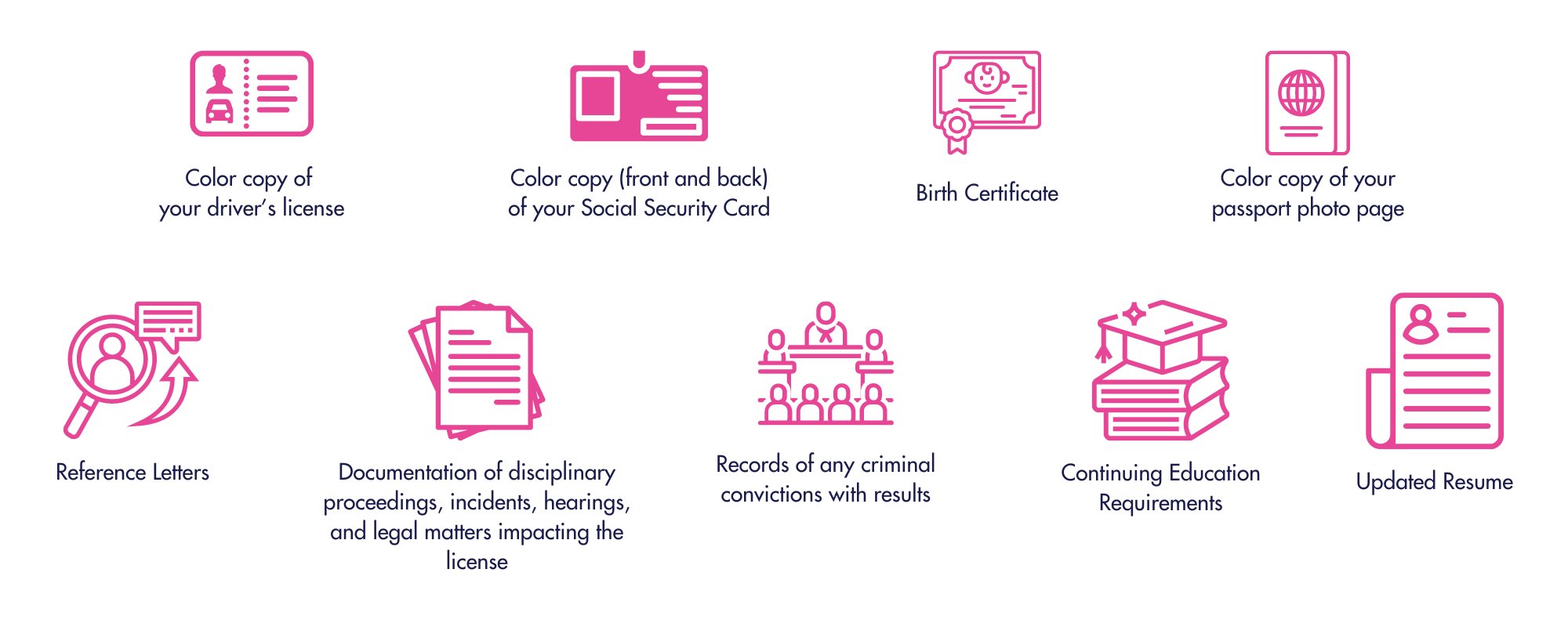NURSE LICENSURE
Congratulations, you’ve decided to take the plunge into travel nursing! You’ve passed your NCLEX, received your RN degree, and gotten some years of experience under your belt – now what? You’re licensed in your home state, but what about other states? Fortunately, we have all of the information you need to be a travel nurse in all 50 states!
Nurse Licensure By State
Every state is different when it comes to getting licensed. Some states are compact while others aren’t. Some are free to apply for your license, while others require a small fee. Whichever state you plan to travel to, it’s important to know what you need to do to get compliant. Click any state below to find out their specific requirements.

NLC State: This state is a part of the nurse licensure compact. Nurses can practice in these states with a single license.
Pending NLC Legislation: These states currently have proposed bills to join the eNLC.
Partial Implementation: Nurses with active multi-state NLC licenses can practice in these locations. However, nurses with these states as their primary state of residency can’t apply for a multi-state license until the NLC is fully implemented.
Currently No Action: These states are not a part of the nurse licensure compact. There is no legislation in place to become part of the NLC at this time.
Tips for Applying
- When applying make sure you are printing legibly in black ink or type out the application.
- Provide your current residential address as verified by tax records. Submitting an alternative address, such as one within a compact state or an address associated with a staffing agency, may lead to potential delays.
- Provide up-to-date contact information, including an active email address. While most Boards of Nursing (BONs) typically use traditional mail for correspondence, having an email address and phone number on file can facilitate prompt communication in case of urgent matters.
- Provide a social security number that have been issued by the United States Social Security Administration. If you do not possess a social security number issued by the U.S., we recommend keeping this section empty. In most states, an SSN is not mandatory for obtaining a permanent license. However, providing false information may result in processing delays.
- Provide details pertaining to your fundamental RN education. This information will be recorded and cross-referenced with the education data listed in the Exam State.
- Document essential information concerning the National Licensing Examination, which should include the following: the specific exam you successfully completed, the date of the exam, the state where the examination occurred, and whether or not you acquired a license in that particular state. If the licensure did not occur in the same state where the examination took place, be ready to provide supporting documents explaining the reasons behind not obtaining the license in that state.
- Provide a comprehensive list of all the countries, territories, and provinces where you have been employed, granted authority to practice, or held a nursing license.
- Document all RN licenses and permissions to practice, starting with the original license issued through examination. Ensure that you include license numbers.
- Blurry or damaged fingerprints can result in a delay in the application process. Many states now provide an alternative to the traditional manual fingerprint card. The Livescan service allows for the electronic submission of fingerprints directly to the Board, significantly expediting the process compared to manual fingerprint cards. However, there’s a caveat: the nurse must be physically present in the state where they seek licensure to complete Livescan. It cannot be done from outside the state. You can locate a nearby Livescan service provider here.
- Apply for your license as far in advance as possible. Each state has an estimated different amount of time it will take to receive your license and processing time could vary due to a variety of factors or errors.
- If you are seeking licensure through endorsement, you will be required to confirm the validity of an active nursing license. We recommend utilizing Nursys.com to fulfill this requirement. Nursys is the sole national database for verifying nurse licensure, disciplinary records, and practice privileges for both RNs and PN/LVNs licensed in participating jurisdictions, which encompass all states within the Nurse Licensure Compact (NLC). However, it’s important to note that not all states make use of this database. If your state does not participate, you will need to verify your license directly through the state’s Board of Nursing (BON).
- Only send sealed transcripts mailed directly from the college or university. Processing times will vary from school to school so make sure you are ordering your transcripts in advance so you do not hold up the process.
- Create a digital document or folder to include documents that will be requested when applying at the time of licensure:
Create a digital document or folder to include documents that will be requested when applying at the time of licensure:

- You have several choices for submitting your license application, which include in-person submission, mailing it in, or applying online. Typically, applying in person is the quickest option. However, if an in-person submission is not feasible, applying online is generally faster than using the mail-in option. Additionally, we advise reaching out to your state’s Board of Nursing (BON) via phone to inquire about your license, particularly if you require expedited processing.
- While awaiting the issuance of either your temporary or permanent license, it’s crucial to monitor its status. Employers may be unable to proceed with candidate interviews until the candidate’s license status is, at the very least, marked as “pending.”
Reasons your License can be delayed:
- Incomplete application
- Illegible application
- Issues with an applicant’s education
- Issues regarding an applicant’s address or declaration of primate state of residency
- The need for eligibility review
- Outdated application
- Not sending the correct amount for the endorsement fee
- Not signing or dating the application
- Missing eligibility documents
Nurse Careers That Require Licensure

Licensing is an essential component of any nursing program. Each state maintains their own regulations so it’s important to know what is needed for each state license that you apply for. The four nursing programs that require licensing are:
-
- Certified Nursing Assistants (CNAs) -multiple states also call this Licensed Nursing Assistants (LNAs)
- Registered Nurses (RNs)
- Licensed Practical Nurses (LPNs)
- Advanced Practice Registered Nurses (APRNs)
General Licensure Requirements
Each state will require different specifications to obtain your license, however in general you will need the following for most states:
-
- Graduation from a board-approved education program
- Pass the NCLEX exam
- Report of all criminal convictions – juvenile convictions, chemical dependencies, and functional ability deficits
- Verification of original state of nursing licensure
- Original transcripts sent to the Board of Nursing (BON). The college or university MUST be the sender of the transcripts.
- Current list of Continue Education Units (CEUs)
- Proficiency in the English language
- Good moral character and sound physical and mental health
What is NURSYS
- National database for verification of nurse licensure, discipline and practice privileges of RNS, LPNs and APRNs licensed in participating jurisdictions, including all states in the Nurse Licensure Compact (NLC).
- Publicly available
- Visit the NURSYS Website
- Nurses can get free license expiration and status updates via email
- QuickConfirm to verify a nurse’s license and discipline status for free
- Request verification when applying to a new state
Types of Licenses
eNLC– The Nurse Licensure Compact (NLC) allows a nurse to have one multistate license with the ability to practice in their home state and the other participating compact states. In 2018, terminology changed, and the NLC became the eNLC.
Walkthrough License – This license allows nurses to start working quickly while they’re in the process of receiving a permanent license for that state. Walkthrough states are an excellent option for travel nurses whose PSOR isn’t a compact state. As we know, licensure times vary significantly from state to state, but there are a few states that process temporary licenses quickly. You may even get your temp license within 48 hours. This is a privilege for nurses who hold a current license in another state. For travel nurses, you’ll also need to be in the application process for your permanent license.
State-Specific License – There are a few states that don’t fit either of those scenarios. And that means you’ll need to apply for licensure to be eligible to work in that state. Since these states operate independently, the licensure timeline can vary greatly. And some states, like California, can take months to issue your license. We recommend being open with your recruiter as soon as possible about your personal and professional goals so they can start the process as quickly as possible. However, our nurses get to enjoy a more efficient experience.

License by Exam vs Licensure by Endorsement
License by examination is for new nurses. To get this license, you need a nursing degree and must pass the National Council Licensure Examination (NCLEX) test. The NCLEX is a standardized exam used by every state’s nursing board to check if new nurses are ready; it’s a national requirement. License by endorsement is for nurses who are already licensed as Registered Nurses in the United States but want to get a license to work in a different state.
Nurse Licensure Compact
- Many states have joined the Enhanced Nurse Licensure Compact (eNLC) since its creation in December 2018. The eNLC is an agreement among participating states to accept each other’s RN licenses. Nurses in eNLC states can provide care in their home state and other eNLC states. This makes it easier for nurses to work across state lines while ensuring public safety at the state level, making it convenient for travel nurses.
- If you already had a compact license, you’ll automatically become part of the eNLC. As more states join, the process becomes more efficient and cost-effective, creating more job opportunities.
- The eNLC aims to:
-
-
- Allow nurses to work in-person or provide tele-nursing services nationwide without needing extra licenses.
- Make it affordable and convenient for nurses to practice across state lines.
- Reduce costs for organizations that employ nurses by eliminating the need for multiple licenses.
- Enable quick response to disasters by allowing nurses to cross state borders and offer essential services.
- Support tele-nursing and online nursing education.
-

Nursing License Renewal
Whether you’re a new graduate getting your license by taking an exam or an experienced nurse getting it by endorsement, you’ll eventually get a permanent license. Once you receive it, it’s your job to keep it in good standing, protect it, and keep it active. The timing for renewing your license depends on your state. Some licenses expire on your birthday, while others expire every 24 months from when you first got it. The rules for renewal also vary by state. Some states may require you to complete a certain number of continuing education units (CEUs) or a specific amount of clinical hours within a certain timeframe.
Temporary Nursing License
While many states offer temporary permits to nurses seeking licensure, not all do. Some states may grant temporary permits to newly graduated nurses waiting for their NCLEX results and who want to work in a nurse-graduate program. Temporary licenses have a short validity of about 6 months, so it’s essential to also apply for a permanent license to avoid any issues when the temporary one expires. Licensing times differ by state, and a few states can issue temporary licenses in just a day or two. However, you must already hold a license from another state. Nurses applying for licensure by endorsement might also receive temporary licenses. The processing time, conditions, and expiration dates can vary, so it’s important to check with the state’s Board of Nursing (BON).
Helpful websites:
FAQ
How is the primary state of residence (PSOR) defined?
This is the state where you mainly live, as confirmed by your official documents from that state, such as your state driver’s license and voter registration card. PSOR does not pertain to owning a home or property.
What do I do before I move to a new state?
You will need to update you PSOR and apply for licensure in the new home state. See more here: Moving Fact Sheet
Do I have a compact license?
Check your license on Nursys.com. The database will tell you practice privileges and compact status. Use the QuickConfirm feature, and it will display the status of your license as single state or multistate.
What are the benefits of being a nurse in a compact state?
Being a nurse in a compact state grants you the benefit of practicing across other fully-implemented compact states with ease. This streamlined process is particularly advantageous for travel nurses, as it simplifies the procedure when seeking employment in a different state. You are relieved from the burdensome task of applying for and renewing multiple state licenses, resulting in significant cost savings. Furthermore, it enables you to swiftly accept job opportunities, a crucial factor in the fast-paced world of travel nursing.
What do I do if I want to work in a non-compact state?
If your Primary State of Residence (PSOR) is within a compact state and you wish to work in a non-compact state, you’ll have to submit an application for a license specific to that particular state. Additionally, you’ll be obliged to meet and uphold the requirements set by that non-compact state, alongside fulfilling the obligations to maintain your compact license.
Is there a time limit for me to practice in other compact states if I have a multistate license?
If you have a multistate license and your primary state of residency (PSOR) is in the NLC (Nurse Licensure Compact) state, you can work in any other NLC state without any time restrictions, as long as you keep your PSOR and don’t do anything that would make another state your new PSOR.
I live in a non-compact state and own a home in a compact state. Am I eligible for a compact license?
No. Your license status is contingent on your Primary State of Residence (PSOR), which is documented through your driver’s license, voter registration, and/or tax address. To qualify for a compact license, your PSOR must be situated in a fully-implemented compact state within the eNLC.
What would change my PSOR unintentionally while practicing temporarily in another NLC state?
A travel nurse working on an assignment in another NLC state using their multistate license must exercise caution to avoid inadvertently changing their PSOR. This could occur in the following ways:
- Registering to vote in the state where you are temporarily practicing due to an upcoming election. It’s recommended to use the absentee ballot to vote through your home state.
- Acquiring a state driver’s license in the state where you are temporarily practicing because your PSOR driver’s license is nearing expiration. Renewing your home state driver’s license before starting the assignment or renewing it online is best.
I'm thinking about moving and making another NLC state my new PSOR. I am a resident of an NLC state and hold a multistate license, what happens?
When you move to a new PSOR (Primary State of Residency), go to the nursing board’s website and apply for a license by endorsement. You can keep working in the new state using your old multistate license until you get the new PSOR license. Once you have the new license, the old one becomes inactive. Don’t wait until your old license is about to expire before getting the new one in your new PSOR.
My PSOR is an NLC state but I decided to move and the new PSOR is a non-compact state. Now what?
Tell the nursing board in your old state about your new address in the noncompact state. This will switch your multistate license to a single state license. If you want a license in the noncompact state, go to the nursing board’s website and fill out the endorsement application. You can do this before you actually move to the noncompact state.
What if I'm licensed in a state with no eNLC?
You have the option to possess several single-state licenses in both compact and non-compact states. This implies that you can seek a license in a compact state while retaining your single-state license from your Primary State of Residence (PSOR).
Does the eNLC pertain to APRNs?
The NLC pertains to RN and LPN licenses only. APRNs hold individual state licenses in each state of APRN practice. Visit APRN Compact for more details.
